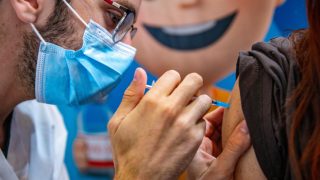Jasen Gundersen never considered a career in business when he entered medical school nearly three decades ago to become a rural primary care doctor.
But, today, he isn’t working in rural America and he doesn’t do primary care. In fact, he no longer practices medicine at all.
As CEO of CardioOne, which provides back-office support to cardiologists, Gundersen is part of a growing trend: physicians and medical school students earning advanced business degrees to work the business side of the booming health care industry.
Just over 60% of medical schools now offer dual MD-MBA programs, more than twice the number two decades ago, a recent study shows. And researchers estimate the number of dual-degree graduates has nearly tripled. Still, it’s difficult to know exactly how many physicians now have business degrees. While the medical school students who simultaneously earned both a medical and business degree represent almost 1% of the roughly 28,000 medical school students who graduate each year, that doesn’t include physicians, like Gundersen, who later go back to school to pursue an executive MBA.
For years, some doctors have sought auxiliary degrees, including master’s degrees in public health and law degrees. But more and more, doctors want to pair their clinical expertise with management skills and financial literacy as the American health system focuses on maximizing profits. Often that’s so they can become business executives, especially as lucrative health tech startups proliferate and hospital systems, pharmacy benefit managers, and insurers have swelled into formidable companies.
However, this pursuit of advanced business degrees begs the question: Whom will these doctors end up serving more, patients or shareholders?
Long gone are the days when nuns ran many local hospitals. Now, many hospitals are part of multibillion-dollar systems, some of which, such as HCA Healthcare Inc. and Tenet Healthcare Corp., outrank some of America’s most recognizable brands on the Fortune 500 list.
Still, it’s one of the few sectors of the economy where the people who know the most about what’s going on in their companies aren’t the ones running them, said J.B. Silvers, a management professor at Case Western Reserve University who has been teaching business fundamentals to medical students and physicians for decades.
Email Sign-Up
Subscribe to KFF Health News’ free Morning Briefing.
In the past, doctors rarely left medicine to join the ranks of management because they tended to earn more as practicing physicians. But that’s changing, Silvers said, especially as new career paths emerge. The MBA can serve as the doorway to those new opportunities — and the potentially lucrative ownership stakes that can come from leading successful medical technology companies.
Physicians earn, on average, $350,000 a year, making them among the highest-paid workers in the U.S. Doctors in primary care tend to make less than that, while the top 1% of physicians can make more than $1.7 million annually.
“There’s a lot of other ways to make more money now,” said Rich Joseph, who, as an MD-MBA graduate from Stanford, is an example of the trend. Joseph, an outspoken critic of how U.S. doctors are trained, is chief medical officer for Restore Hyper Wellness, which offers cryotherapy and IV drips at locations across the country.
Doctors are considered the face of the health care system, but a lot of big decisions are made in the boardroom, said Folawiyo Laditi, a recent graduate of Yale’s MD-MBA program and a urology resident at the University of Pittsburgh.
Laditi wants to leverage his business degree to tackle systemic issues in health care that sometimes don’t always feel “fixable” as a doctor treating a single patient at a time. He hopes “to make changes that can affect a lot of patients and a lot of people at once.”
Medical schools are selling the power that comes from the dual degree. “Ready to pair your clinical expertise with business best practices to transform your organization? Hone your business acumen to assume a greater scope of leadership,” touts the website of the University of Tennessee’s physician executive MBA program.
Harvard University says on its website that its dual-degree program is intended to “develop outstanding physician leaders, skilled in both medicine and management, to take positions of influence through which they will contribute substantially to the health and well-being of individuals and society.”
Gundersen, the CardioOne CEO, who attended the University of Tennessee program and now lives outside of Denver, found it useful to practice medicine for years after he got his business degree, juggling executive and clinical work. He stopped treating patients nearly four years ago.
It helps to speak the language of physicians, Gundersen said while in Florida during a summer business trip to sell cardiologists on using his company’s platform. He pitches alleviating a pain point for most doctors — the nondoctoring work — so they can focus on patient care. It’s something he felt as a practicing physician.
Gundersen said the nation needs more doctors, especially ones who remain independent from sprawling health care companies. As he promotes that message to prospective cardiac doctors, Gundersen recognizes the irony. “We need more doctors, and here I am the doctor who doesn’t doctor anymore,” he said.
Note: This article have been indexed to our site. We do not claim legitimacy, ownership or copyright of any of the content above. To see the article at original source Click Here












